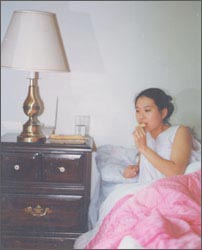
Copyright ⓒ 2014 John Sangwon Lee, MD., FAAP
Dizziness and fainting during pregnancy 어지러움증과 단순기절(현기증과 단순 기절)

Nausea and vomiting can occur during the first 3 months of pregnancy
![]()
A mild headache during pregnancy is one of the most common symptoms of pregnancy. Particularly in the early stages of pregnancy, a slight headache can sometimes occur with a thin head.
The cause is not known for sure, but it is said that such a headache occurs due to normal changes in blood circulation in the brain in the early stages of pregnancy.
In addition, when the fetus is grown and enlarged when blood vessels or nerves in the pelvic cavity are pressed, when blood sugar levels are low when there is low blood pressure when you are sitting or lying down and suddenly get up, when the temperature is hot or when the surrounding temperature is high,
Dehydration can cause some dizziness in pregnant women for other reasons. These dizziness symptoms are relatively common.
Benign simple fainting can occur during pregnancy. This can cause you to lose consciousness for several seconds.
But it doesn’t happen that often. Benign simple fainting is more likely to occur if you have the dizziness symptoms described above or if you have any disease, such as anemia. Benign simple fainting occurs in pregnant women because the blood flowing into the brain is not normally enough for a while when suddenly awakening from a lying or sitting state. It is common that benign simple fainting itself does not harm the pregnant woman or fetus. However, if fainting occurs, whether it is benign or pathological fainting, you should contact your doctor immediately.
It is important to start slowly maneuvering while sitting or lying down during pregnancy and not getting up suddenly.
During pregnancy, especially during the 2nd trimester and the 3rd trimester, do not lie down on the floor with your head and back, and lay your head and sides on the floor to reduce dizziness. In order to keep the blood sugar at a normal level, eat regular foods and carry foods such as dry fruit or whole-grain crackers, even when going outdoors for a while or going out for a short distance, and eat when necessary so that you don’t get hungry. Even normally, eat enough foods containing protein, carbohydrates, fats, fiber, and vitamins in a balanced way.
Drink plenty of water to avoid dehydration, do not limit salt intake, and should be consumed normally.
When it’s too hot to get dizzy or faint, rest in a fresh and cool place, wear tight clothes loosely, and change into lighter clothes.
As explained above, if you have fainting symptoms, it is better to lie in a fresh, cool place, contact your doctor, and follow his instructions for diagnostic treatment. If you feel dizzy or severely dizzy, you should also consult your doctor. Copyright ⓒ 2014 John Sangwon Lee, MD., FAAP
“부모도 반의사가 되어야 한다”-본 사이트의 내용은 여러분들의 의사로부터 얻은 정보와 진료를 대신할 수 없습니다.
“The information contained in this publication should not be used as a substitute for the medical care and advice of your doctor. There may be variations in treatment that your doctor may recommend based on individual facts and circumstances.
“Parental education is the best medicine.“